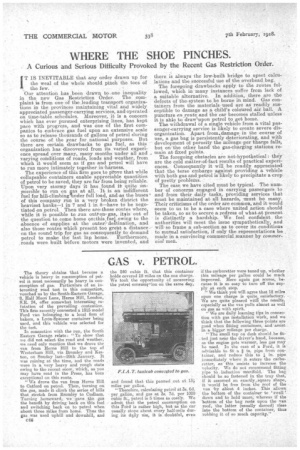WHERE THE SHOE PINCHES.
Page 20

If you've noticed an error in this article please click here to report it so we can fix it.
A Curious and Serious Difficulty Provoked by the Recent Gas Restriction Order.
IT IS INEVITABLE that any order drawn up for the weal of the whole should pinch the toes of the few. . \ . , Our attention has ,been drawn to. one inequality
in the new Gas Restriction Order. The complaint is from one of the leading transport organiza
tions in the provinces maintaining ' vital and widely appreciated passenger-carrying services and operated on time-table schedules. Moreover, it is a concern which has ever pursued enterprising lines, has kept pace with progress, and was one of the first companies to _embrace gas fuel upon an extensive scale so as to release thousands of gallons of petrol during the course of the year for national purposes. But there are certain drawbacks to gas fuel, as this organization has discovered from its varied experience spread over many, many months under all and varying conditions of roads, loads and weather, from which it would seem as if gas and petrol will have to run more intimately together in-harness. The experience of this firm goes to prove that while collapsable containers enable appreciable quantities of petrol to be saved, they are far from being reliable. Upon very stormy days it has, found it quite impossible to run on as at all. It is an indifferent fuel for hill-clirnbineinder full load, and,as the buses ' of this company run in a very broken district the heaviest banks-1 in 7 and -1 in 8—have to be negotiated on petrol. Then there are,those .routes where, while it is possible to run mitten-. gas, itsis out of the question to. come home on:this Juel. owing to the absence of supplies at the outer,. deAtination, and also those routes which present too great a distance on the round trip for gas as consequently to demand petrol to make the last lap home. Furthermore, roads were built before motors were invented, and
there is always the low-built bridge to upset calculations and the successful use of the overhead bag.
The foregoing drawbacks apply to the routes followed, which in many instances suffer from lack of a suitable alternative. In addition, there ate the defects of the, system to be borne in mind. Gas containers from the materials used are as readily susceptible to damage as a child's coloured air ball. A puncture en route and the car becomes stalled unless it is able to-draw\ipon petrol to get home. The withdrawal of a single vehicle from a vital passenger-carrying service is likely to create severe disorganization. .Apart from.damage in the course, of use, a gas bag is persistently deteriorating, and with development of porosity the mileage per bharge falls, but on'the other hand the gas-charging stations remain at fixed pomts.
The foregoing obstacles are not:hypothetical : they are the cold matter-of-fact results of practical experiences. Consequently it will be readily appreciated that the terse embargo against providing a vehicle with both gas and petrol is likely to precipitate a crop of pretty problems.
The case we have cited must be typical. The number of concerns engaged in carrying passengers to and from their daily tasks, providing services that . must be maintained at all hazards, 'must be many. Their criticisms of the order are common, and it would seem to us to be a case where united action should be taken, so as to secure a redress of what,at present is distinctly a hardship. We feel confident theauthorities will meet the issue sympathetically, and willso frame a sub-section as to cover its conditions to mutual satisfaction, if only the representations be , made in a convincing commercial manner by commercial men.






















